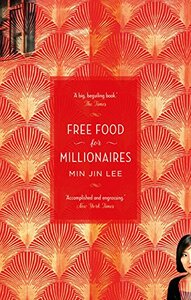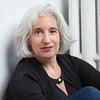Take a photo of a barcode or cover
emotional
funny
hopeful
medium-paced
Plot or Character Driven:
Character
Strong character development:
Yes
Loveable characters:
Complicated
Diverse cast of characters:
Yes
Flaws of characters a main focus:
Yes
emotional
reflective
medium-paced
Plot or Character Driven:
Character
Strong character development:
Yes
Loveable characters:
Complicated
Diverse cast of characters:
Yes
Flaws of characters a main focus:
Yes
the three stars in a way don't reflect how much I liked this book - I continually picked up and put it down only to finish the whole second two-thirds in one morning. The character development is, I think, really good, and at the end I felt we were only getting started. That said - there are flaws. Her second book, Pachinko, shows none of them, so I think it is mostly progression as a writer (and here I am, armchair critic :)
I appreciated the stories, perspectives, and as I said, character development. I was a bit tired and also uncertain of the veracity of the big-shopping-ivy-league thing, oh poor casey - however, I suppose the point of a book isn't to be in touch, just to represent someone's experience.
I appreciated the stories, perspectives, and as I said, character development. I was a bit tired and also uncertain of the veracity of the big-shopping-ivy-league thing, oh poor casey - however, I suppose the point of a book isn't to be in touch, just to represent someone's experience.
Interesting story intersecting the lives of several Asian and Asian-American New Yorkers. I like the time period--early 1990s--and the characters of Ella and Casey, recent college graduates whose lives take different trajectories yet they become close. The only problem I had was the omniscient POV, because it was difficult to work up deep feelings with any specific character because of the head hopping. But a wonderful novel of the immigrant experience.
Likes: immersive story, great character development, immigrant story, generational story, author seems to have done lots of research on religion, investment banking, hat making. I found myself empathizing with Casey and other characters, even when they made poor choices.
Dislikes: narrator mis-pronounces too many words, wish it was a Korean-American narrator, quick-changing points of view between characters was often hard to follow.
Dislikes: narrator mis-pronounces too many words, wish it was a Korean-American narrator, quick-changing points of view between characters was often hard to follow.
Graphic: Rape
Hmm. I don’t think I liked this one. For a number of reasons.
Too many unlikeable characters and the ones that weren’t unlikeable were bland; too many infidelity plot lines for a novel that didn’t seem like it was particularly interested in interrogating the prevalence of infidelity; too many desperately unnecessary plot lines and not much substance; also it did not need to be as long as it was.
I will leave room for the fact that there is probably a lot of significance of the events of this novel that were lost on me as someone who is not a Korean American, but also this novel was hardly subtle.
I’m glad I read Pachinko before I read Millionaires — this was fine, but I think a lot of the things that Min Jin Lee tried here were perfected with her second novel.
Too many unlikeable characters and the ones that weren’t unlikeable were bland; too many infidelity plot lines for a novel that didn’t seem like it was particularly interested in interrogating the prevalence of infidelity; too many desperately unnecessary plot lines and not much substance; also it did not need to be as long as it was.
I will leave room for the fact that there is probably a lot of significance of the events of this novel that were lost on me as someone who is not a Korean American, but also this novel was hardly subtle.
I’m glad I read Pachinko before I read Millionaires — this was fine, but I think a lot of the things that Min Jin Lee tried here were perfected with her second novel.
emotional
funny
tense
medium-paced
Plot or Character Driven:
Character
Strong character development:
Yes
Loveable characters:
Yes
Diverse cast of characters:
Yes
Flaws of characters a main focus:
Complicated
emotional
hopeful
lighthearted
reflective
medium-paced
Plot or Character Driven:
A mix
Strong character development:
Yes
Loveable characters:
Yes
Diverse cast of characters:
Yes
Flaws of characters a main focus:
Yes
slow-paced
Plot or Character Driven:
Character
Loveable characters:
Complicated
Diverse cast of characters:
Yes
Flaws of characters a main focus:
Yes
I really like the writing style and I like that Casey is flawed. Peaceful ending.
I can’t decide if this book was a tad bit too long, or just right. Min Jin Lee takes you through the story of Casey and her supporting characters along her post-college years after Princeton, making all of the wrong decisions, some right ones, and some decisions that made me question why I judge people’s decisions.
In short, I loved it. In long, I was blown away by the realistic but beautiful prose of the story. I savored the book’s reflection of the humanness of being in your 20s (and 40s… and 50s…) and feeling completely behind, confused, but living life regardless. I loved the Korean family and identity aspect of the book, from Jay & Casey to Unu to Hugh to Ella & Ted. The experience of being in a community connected to identity is relatable, and the author did a spectacular job of making me feel like I could understand what Casey was going through with her parents, her relationships, her professional life, and herself.
At certain points I felt like the book had run its course. Around page 300 something, I was like, are we really introducing a new subplot? Are we really still doing this? But by the end, I understood why we needed all of the book. We needed character development for everyone (except, pointedly, Joseph Hong - but maybe that was a purposeful choice).
My biggest takeaway from Free Food for Millionaires is that you can’t predict how life will happen, which people will come in and out of your life, how money will affect you forever, or how your sense of self may change. I would never want to be Casey, but I’ve learned a lot from her, and want to take on the parts of her I admire - her non judgment, her pointed selfishness, and her ability to let life happen and live in the moment. I will not take on her addiction to hats.
Would definitely recommend to a friend, but you need to stay in it. 560 pages later, and I’m ready for something a little breezier!
In short, I loved it. In long, I was blown away by the realistic but beautiful prose of the story. I savored the book’s reflection of the humanness of being in your 20s (and 40s… and 50s…) and feeling completely behind, confused, but living life regardless. I loved the Korean family and identity aspect of the book, from Jay & Casey to Unu to Hugh to Ella & Ted. The experience of being in a community connected to identity is relatable, and the author did a spectacular job of making me feel like I could understand what Casey was going through with her parents, her relationships, her professional life, and herself.
At certain points I felt like the book had run its course. Around page 300 something, I was like, are we really introducing a new subplot? Are we really still doing this? But by the end, I understood why we needed all of the book. We needed character development for everyone (except, pointedly, Joseph Hong - but maybe that was a purposeful choice).
My biggest takeaway from Free Food for Millionaires is that you can’t predict how life will happen, which people will come in and out of your life, how money will affect you forever, or how your sense of self may change. I would never want to be Casey, but I’ve learned a lot from her, and want to take on the parts of her I admire - her non judgment, her pointed selfishness, and her ability to let life happen and live in the moment. I will not take on her addiction to hats.
Would definitely recommend to a friend, but you need to stay in it. 560 pages later, and I’m ready for something a little breezier!







